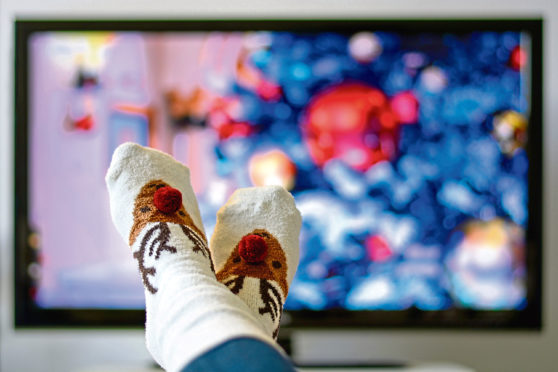We Brits love our Christmas traditions – the mince pies, the switching on of the lights, 24/7 Mariah Carey, crossed fingers that the kids’ online presents arrive before February, the Elf on the bloody Shelf. And, of course, ’tis the season to grumble about the BBC.
The annual announcement of the Beeb’s schedule for that honeyed period between Christmas Eve and Boxing Day unites the nation in a festive orgy of complaint. The same tired movies, 1970s comedy repeats, and deathless, year-round quiz shows cheaply tarted up with Santa hats and a sprig of tinsel. We watch, all the same, because Christmas TV isn’t about existential traumas directed by Lars von Trier or cutting-edge opera in which the words “inescapable abyss” are sung over and over with increasing intensity for three hours.
Despite what we say, we want Morecambe And Wise, we want Toy Story 2, and we want the Queen. We might not pay much attention, but it’s enough to know they’re on and that the world is as it should be.
Except, of course, the world is not as it should be. This has been a year of surreal disorientation, in which the odd has become familiar and the familiar odd. We have spent much of it confined within four walls, emerging only when safely cocooned in whatever kind of homemade hazmat suit we’ve cobbled together. We’ve been separated from loved ones, surrounded by fear and loss, and developed a scary new vocabulary of “getting the R number down”, “furlough”, “sadly died” and “Matt Hancock”. We’ve found humour where we can in neologisms like “quarantini” (a cocktail made from whatever dregs are left in the drinks cabinet) and the rhyming slang of “Miley Cyrus”.
No, the world is not as it should be. As it has for a century, the BBC has been our constant companion through these 12 months of displacement and angst. In the era of Netflix, Amazon Prime and Sky it no longer dominates television and culture in the way it once did, but it has mattered – reassuring, visible proof that not everything valuable and traditional has been uprooted and destroyed.
Yet within the Beeb, a state of siege mentality exists. The corporation has been under sustained fire of one kind or another since at least 2014, when “Yes” campaigners in the independence referendum decided it was an agent of the British state that was hostile to their aims. This set the tone for what has followed. Through Brexit, Boris, the rise of populism and the battle with Covid, the BBC has been accused of failure – failures of reporting, of understanding, of bias, of purpose. Laura Kuenssberg has been denounced as both a Tory puppet and a Labour stooge; Emily Maitlis for being too gobby; Naga Munchetty for taking dosh to host corporate events. The Brexit ultras have attacked the corporation for being too Remainy, while Remainers have accused it of sucking up to Brexiteers. It has been criticised for screening Nicola Sturgeon’s daily press conferences throughout the Covid outbreak and for considering removing Rule, Britannia! from the Proms.
And on it goes. Something had to crack, and in September, Tim Davie was appointed as the new director-general. Davie seems to accept many of the criticisms made against his organisation and has begun to crack down on the most egregious examples. It will not be enough for the critics, because nothing will do other than the reduction of this national institution to the tiniest of blips on the radar.
There is much wrong with the BBC – it is wasteful with taxpayers’ money, top-level salaries are too high, it is sluggishly bureaucratic, and has at times been too greedily ambitious for its own good. But the past year has, if anything, made the case for its enduring importance.
Many of us watched the US election through the prism of American TV, and as entertaining as this was, it nevertheless painted a lurid picture of a BBC-less world – flagrant untruths reported as fact, open hostility towards the “other” side, a refusal to grant the winner the basic decencies. We wrestle with fake news, where technology has enabled the kind of corruption that means neither words nor video can be taken at face value, and where social media relentlessly misrepresents the truth. This birthed Donald Trump, a standing rebuke to our shared humanity.
Amid it all, the BBC stands as a beacon of restraint, balance and perspective. The political fundamentalists will rage and rant, but most of us know that this reasoned, curious voice represents the better side of us. It is a source of stability in an age of upheaval, and we should treasure it.










